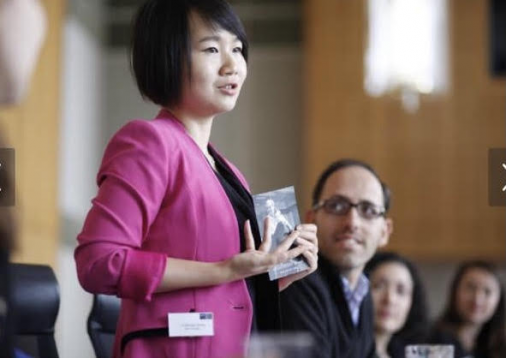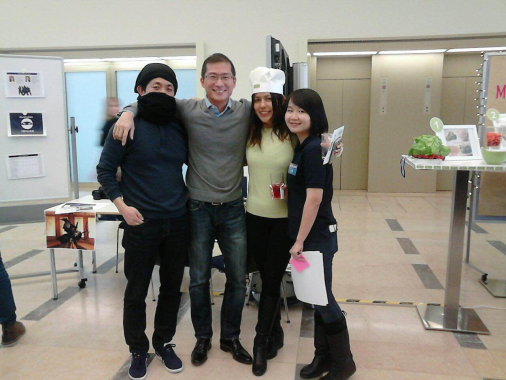

Ye Sheng graduated with an MBA from ESMT Berlin back in 2014. We caught up with her to find out what she has been up to since then and to see what advice she has for MBA applicants and students.
Tell us about your pre and post-MBA career
I worked for Standard Chartered Bank in China before coming to Germany to study my MBA. In 2008, after a six-month internship in London, I returned to Shanghai to take part in a two-year Management Trainee Program at Standard Chartered Bank.
During this program, I rotated among various locations such as India, Singapore, and China. My role included recruitment, compensation and benefits, HR project management, and HR business partner management. After the 2-year program was complete, I took the position of Performance, Compensation, and Benefits Manager.
In 2014, I decided to come to Germany to study my MBA and have been in Berlin ever since. In general, I experienced two career transitions after my graduation.
Firstly, I transferred from traditional large multinational companies, including Standard Chartered Bank and my first post-MBA job at E.ON. to startups such as SoundCloud. Now I work for Wayfair, which is going through the transition process from a startup to a public listed, multinational company.
Secondly, my role changed from being a dedicated HR Performance, Compensation & Benefits (C&B) Expert who focused on company C&B policies and performance review processes, to a HR Business Partner who works closely with business leaders to provide them with professional advice on all aspects of HR strategy, and at the same time, collaborates with other HR departments to drive and implement HR related policies.
For MBA applicants, in addition to the tuition fee, other costs such as time and opportunity should also be considered. Did you find the MBA experience worthwhile?
Studying for an MBA at ESMT is one of the best and most important decisions I have made in my life.
After working at Standard Chartered for 5 years, my boss and colleagues endorsed my performance and were convinced of my high potential. I could have been promoted to the leadership level soon and my parents didn’t understand why I was going to quit my job and study abroad when life seemed perfect in Shanghai.
Of course, there were many costs. In addition to the tuition fees, a substantial opportunity cost was incurred from not receiving any income for at least one year. Had I not chosen to go abroad, perhaps I could have made a career leap in 2014. These were my costs at that point.
After being in Germany for a while, I realized another hidden cost. My work experience and networks that I accumulated before my MBA would be discounted in the German labor market, as I had limited knowledge about German workplace culture. Furthermore, my German was not fluent. Given the circumstances, I would have to excel much more compared to my German colleagues .
Why did I make up my mind to come to Germany for an MBA considering all these costs? To answer this question, everyone needs to figure out what his or her goals in life are.
Personally, a higher position or better salary may be significant goals for me, but they have never been my main goal. I’m looking for depth in my life and hope to experience different things and meet different people in a finite lifetime. My life doesn’t have to be smooth, but I never want it to be monotonous! Therefore, studying for an MBA abroad was a way for me to achieve that.
During the year at ESMT, I was exposed to people and things that were completely different from those in China. Although it was not my first time working abroad, it was really the first time that I spent so much time in a foreign country and had such wide and deep contact with a diverse group of people.
There were more than 60 students in my class from more than 30 countries. We were all together from 9 a.m. to 9 p.m., and sometimes even on weekends, attending classes, group discussions, preparing team assignments and exams, participating in extracurricular activities, so on and so forth.

Often, we discovered that we had different opinions, and everyone had his/her own perspective. It was at that point that the communication methods that were applicable in China did not always work anymore. You need to understand each other’s cultural background, interests, and personality traits to find the best path to be able to work together efficiently and effectively.
This experience is the best gift from the ESMT MBA program and further helped to build up my confidence for future success in the workplace. Some of my classmates returned to their home countries after graduation but we still keep in touch, and from time to time we also talk about our learnings from the MBA program. All of us agree that the international mindset and cross-cultural communication skills have been a great benefit for us no matter where we have ended up.
Why did you choose ESMT and do you have any advice for applicants who are considering studying an MBA abroad?
The reason was very simple. I had always liked Europe due to my previous six-month internship experience in London. I wanted to be in Europe again so I applied for several MBA programs in Europe and got offers from them all.
Compared to other offers, ESMT attracted me the most. I was impressed by the quality of the faculty and the alumni network during the fact-finding part of my application. Most importantly, ESMT offered me “The Women’s Leadership Scholarship”. This scholarship delivers a clear message. This business school values diversity and is willing to support women’s leadership development, which is in alignment with my own values and beliefs. So, here I came!
I would like to suggest that you consider two things if you’re going to pursue an MBA abroad. The first thing to consider is the process. Is the country you’re going to attractive to you? Are you interested in meeting local people and understanding their culture? Do the school’s values match yours? Are students’ backgrounds diverse enough? Here you should listen to your heart fully to ensure you have fun along the way.
Another thing to consider is the result, which is normally that you have the chance to have a bright career after graduation. How is the economy in this country? What kind of industries are very well developed? How is this country’s job market? Will you need to speak a different language? What is its employment rate? How friendly is the country’s policy towards employees, freelancers, and entrepreneurs? A strong economy can provide as many opportunities as possible to job seekers. Here you need to collect as much information as possible to figure out whether choosing this country can help you fulfill your career goals or not.
You are now working in the field of human resources and have lived and worked in Germany for many years. What advice can you offer ESMT students about career development?
Let me share my story about my job search first. ESMT could assign a career development mentor to each student upon request. So, in my first week at ESMT, I visited the career services team and asked them to help me find a career development mentor. I made two requests very clear: firstly, I hoped my mentor was from an HR function, and secondly, I hoped s/he was in Berlin so that I would have the opportunity to meet her/him in person. The career services team helped me find a mentor who worked in HR at E. ON. Luckily, a few months before graduation, I saw E.ON had a vacancy for a Compensation & Benefits Expert, so I applied right away and asked my mentor to refer me internally at the same time. In the end, I got the job very smoothly.
Based on this story, my advice is as follows.
Firstly, you need to be proactive. Although not all resources or support are straightforward, for example, some resources may be very general or seem useless at first glance, what you need to do is to be bold and proactive, raising requests and asking for specific help. It is very helpful to find the key persons in your desired industry and constantly build a network. When you make a request to your network, it is always a good idea if you can give people more context to engage them to help you.
Secondly, it is important to maintain a good balance between give and take. As job seekers or newbies, you sometimes take more from others instead of giving. That is normal because you need help at the beginning to stabilize yourself in a new environment. However, you cannot expect to constantly receive something if you don’t offer something in return. Once the balance between give and take is broken, difficulties arise, and people around you feel they are not getting much from their relationship with you. What you give doesn’t have to be always a big favor. Small help works too. For example, taking meeting minutes when you just join a company would be a great help to your colleagues. Plus, you don’t need to offer your help immediately in return, however, you need to have this “give and take” mindset. Once you can give, you should always extend a helping hand.
Most applicants haven’t learned German. Even though courses are taught in English at ESMT, will it be an obstacle when searching for a job or developing a future career if you don’t speak German?
I didn’t speak any German before applying to ESMT. I spent two months in Shanghai taking the A1 German course after I got the MBA offer. At that time, I thought it was a must to master German because I would like to continue my career in HR in Germany after graduation. During my MBA studies, even though I was quite busy with all kinds of team assignments and exams, I still used 10%-20% of my time to learn German (e.g., evening German class, private German teacher on the weekend, etc.). When I graduated from the MBA program, my German was at B1/B2 level.
In Germany, particularly in big cities such as Berlin, Munich, and Dusseldorf, the working language may just as often be English as it is German. It is possible to find a job in Germany without speaking German. I have been using English as my working language after graduation without any problem. Nevertheless, I keep learning German by attending evening classes at the Goethe-Institute after work. During the Covid-19 lockdown this summer, I spent even more time learning German and I passed the Goethe-Zertifikat C1 exam in June.
For those who plan to stay in Germany after graduation for the long term, I suggest that you dedicate some time and energy to learn the language. Even though your working language may be English, it would be a huge advantage for you if you can speak German. For example, officially you use English at work to exchange your ideas with your colleagues, however, if you can speak some German with your colleagues or even lead a discussion in German, the chance that you build a mutual trust with them is obviously higher.
Furthermore, I found that when my German colleagues speak German with me, they tend to discuss the topic in more depth and share more information with me naturally. Finally, speaking German is very practical and helpful for your daily life, that is, you can have access to all kinds of channels. For example, I could read German news to know the German government’s policy on Covid-19, as first-hand information, and I don’t need to read translated news or ask my German friends what is going on now.
Do you have any tips you would like to share with our students about how to find a job as a foreigner in Germany?
First, I don’t think it is necessary to perceive yourself as a foreigner when looking for a job. This would affect your mindset and behavior. You may feel at a disadvantage when searching for a job, considering you are neither a German native speaker nor an English native speaker. My personal experience is that every time I changed jobs in Germany, I always got at least two job offers. In my most recent job change during the Covid-19 pandemic, I even got three job offers at the same time.
It is important to have our own style and stories. Sometimes language may not be our strength, but we have other assets, such as multicultural background, critical thinking methods, experience with large projects, and the ability to constantly reflect on and improve ourselves. In addition, we should be aware that communicating effectively is different from being able to speak English/German well. For every job interview, we need to believe in ourselves that we are unique and valuable, and then talk with our potential employer confidently eye-to-eye.
You should make the most of your year at school for constant observation and practice. During the MBA studies, students are divided into groups of 5 or 6 people to work on many team assignments, where students play different roles and need to collaborate to achieve the best possible result. Through discussion and arguments, students must come up with a solution that is accepted by every team member. Afterwards, with clear roles and responsibilities allocated, the team should implement this solution together. Sound familiar to some scenarios in the workplace?

At school, we can really learn by trial and error. School is a relatively safe environment, if we have ideas/opinions, we should be brave enough to try them out. Sometimes, we propose some changes/plans, which may seem strange to others, or we try to convince others by a certain method, which may not work out in the end. This is OK as it’s the learnings that really count in the end. There won’t be any serious and real consequences to a temporary failure at business school. Thus, it is important to make the best use of your time at school to keep practicing. There are many ways to influence people and take the driving seat to lead people when working together. Interestingly, some may be very different from our general practice in our home countries.
Since graduation, what alumni events do you usually attend?
I attend the Annual Alumni Meeting organized by the school every year. It’s usually a full day of workshops and seminars on different topics, with influential guest speakers. After the event, the MBA alumni and guest speakers will have dinner together. This event provides me with a platform to meet some of my old classmates and professors. We use this opportunity to catch up with each other about how things have changed since the MBA in our personal and professional lives.
Sometimes I also get to know some new people through this platform. People interested in the same topic as myself are likely to participate in the same workshop/seminar as me, so it’s easy to start to talk to them and lay the basis for potential collaboration in the future. Anyone who studied at ESMT is likely to be in a good career position, making it a great opportunity for networking.
What’s more, my fellow alumni from the MBA Class of 2014 have small gatherings from time to time. For example, if someone comes to Berlin on a business trip, we will meet up and spend some time together. Having spent such an intense year on the MBA, I think a great thing about my time at ESMT is that I have made such good friends.
